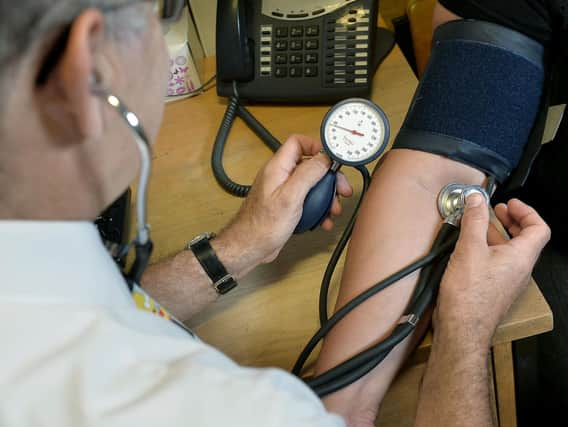Massive surge in telephone GP appointments as Blackpool doctors adapt to social distancing during pandemic


In the 12 months up to February, more than 85 per cent of appointments in Blackpool took place in person. Just 13 per cent were over the telephone and none via video conference.
But the Royal College of GPs (RCGP) says that has been turned on its head following government guidance in light of the coronavirus pandemic.
Advertisement
Hide AdAdvertisement
Hide AdSeeing a GP face-to-face is now making up seven per cent of all contact, RCGP's chairman said, as he praised the profession's "remarkable "response.
Age UK has, however, urged doctors not to drop home visits and to seek out vulnerable patients "proactively".
Prof Martin Marshall, chairman of RCGP, said around 40 per cent of patients would normally be triaged before booking an appointment.
Now all patients are initially assessed on the phone before booking either a call or video link with a doctor.
Advertisement
Hide AdAdvertisement
Hide Ad"Most of the consultations are taking place on the telephone rather than video link," he said.
"People are pretty happy with doing assessments over the phone and they are proving effective.
"Who would have thought this 150-year-old technology would still be just as useful today?"
He said there were occasions where a video appointment was beneficial, particularly in the case of assessing skin rashes.
Advertisement
Hide AdAdvertisement
Hide AdBut with people able to email in pictures of the affected area, he said phone calls have been used in around 90 per cent of cases.
In 2019, two thirds of all regional NHS commissioning areas - including Blackpool CCG - carried out no video call appointments, NHS data shows.
"The big question is which elements do we want to embed in our practices in the future?" Prof Marshall said.
"I don't see us doing all of our consultations over the phone or online, but certainly up to 50 per cent is possible."
Advertisement
Hide AdAdvertisement
Hide AdThere are still occasions where patients need to attend a practice in person, such as where blood pressures or oxygen saturation needs to be read, he said.
Regional NHS areas are establishing "hot and cold" practices to mitigate the risk of infection.
Hot practices assess people with clear Covid-19 symptoms only.
In more rural areas this can take the form of a single room in a surgery. In bigger areas it can be several surgeries. Though Prof Marshall said just as many precautions were being taken at cold sites.
Advertisement
Hide AdAdvertisement
Hide AdConcerns have also been raised that people who may not have access to smartphones or a computer, will be excluded from seeing their GP during the crisis.
Elderly needs charity Age UK has urged practices to be "proactive" in contacting people on their registers known to have underlying health conditions.
Senior health influencing manager at the charity, Tom Gentry said: "Surgeries have a lot of information at their disposal. Using that, they need to make active care plans for people to enable them to feel supported.
"It's about not waiting for people to deteriorate and it's about reaching out to them first."
Advertisement
Hide AdAdvertisement
Hide AdMr Gentry said that surgeries should also not discount the use of home visits, providing adequate precautions are taken.
"No one should be told outright that they should not be visited in their own home," he said.
Comment Guidelines
National World encourages reader discussion on our stories. User feedback, insights and back-and-forth exchanges add a rich layer of context to reporting. Please review our Community Guidelines before commenting.